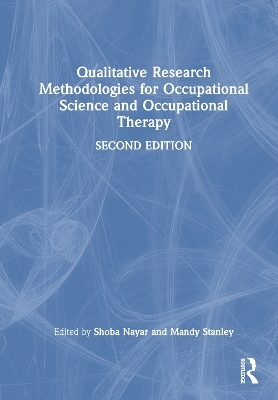
Qualitative Research Methodologies for Occupational Science and Occupational Therapy
Routledge (Verlag)
978-1-032-59779-9 (ISBN)
This comprehensive text provides a practical introduction to the range of qualitative methodologies and methods being used by occupational science and occupational therapy researchers today, enabling readers to produce and critique high-quality qualitative research themselves.
Showcasing a diverse range of qualitative research from both academic scholarship and the wider community of health professionals, each chapter combines both foundational knowledge and therapeutic applications. Importantly, the book lucidly explains the synergy between research problem, choice of methodology, and methods. It also fosters a best-practice approach, ensuring that qualitative research is epistemologically sound while reflecting the values and beliefs of the diverse communities within which research is conducted.
This new edition, featuring an international range of authors, also addresses new and cutting-edge research methodologies, including Indigenous methodologies, netnography, the visual arts, and Big data. It is the ideal textbook for any student, practitioner, or researcher of occupational science and occupational therapy.
Shoba Nayar is a New Zealand trained and registered occupational therapist. Since completing her PhD in occupational science, she has held various roles in academic institutions in New Zealand, the United Kingdom, and India. Shoba currently works as an independent academic, offering consultation services to academic institutions and postgraduate students in the area of qualitative research. Mandy Stanley is a Professor in the School of Medical and Health Sciences at Edith Cowan University, Perth, Australia. Mandy is a senior academic with an established program of funded research who has taught qualitative qualitative research to both undergraduate and postgraduate students, and successfully supervised higher degree students writing qualitative theses and more than 30 Honours students.
1.Introduction to The Second Edition . 2.Tenets of Qualitative Research: Deepening Understandings. 3.Connections, Disruptions and Transformations: Decolonizing Qualitative Research. 4.Qualitative Descriptive: A Very Good Place to Start. 5.Grounded Theory. 6.Phenomenology. 7.Case Study Methodology. 8.Narrative Inquiry. 9.Ethnography. 10.Critical Discourse Analysis. 11.Participatory Action Research. 12.Visual Methodologies: Photovoice in Focus. 13.Visual arts-based methodologies. 14.Community-Based Research. 15.Netnography. 16.Qualitative Evidence Synthesis. 17.Big Qualitative Data. 18.Best (or Better?) Practices.
| Erscheinungsdatum | 11.11.2023 |
|---|---|
| Zusatzinfo | 22 Tables, black and white; 6 Line drawings, black and white; 5 Halftones, black and white; 11 Illustrations, black and white |
| Verlagsort | London |
| Sprache | englisch |
| Maße | 174 x 246 mm |
| Gewicht | 840 g |
| Themenwelt | Sachbuch/Ratgeber ► Gesundheit / Leben / Psychologie |
| Medizin / Pharmazie ► Medizinische Fachgebiete ► Arbeits- / Sozial- / Umweltmedizin | |
| Medizin / Pharmazie ► Physiotherapie / Ergotherapie ► Ergotherapie | |
| Medizin / Pharmazie ► Physiotherapie / Ergotherapie ► Rehabilitation | |
| Studium ► Querschnittsbereiche ► Prävention / Gesundheitsförderung | |
| ISBN-10 | 1-032-59779-8 / 1032597798 |
| ISBN-13 | 978-1-032-59779-9 / 9781032597799 |
| Zustand | Neuware |
| Informationen gemäß Produktsicherheitsverordnung (GPSR) | |
| Haben Sie eine Frage zum Produkt? |
aus dem Bereich


